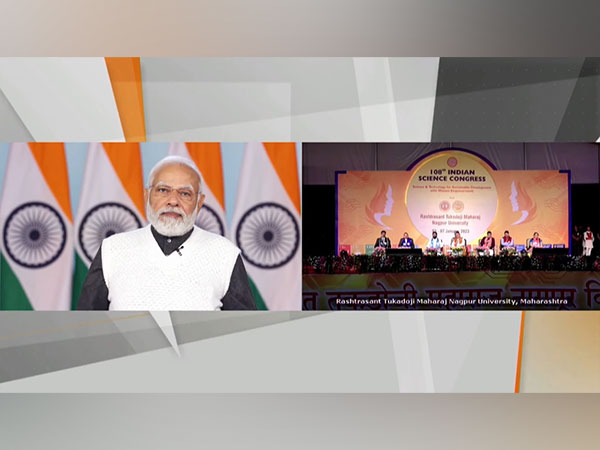Prime Minister Narendra Modi on Tuesday underlined the importance of women’s involvement in scientific research and that the increasing participation of women is a reflection of the progress of society and science.
“Today, the country’s thinking is not only that women should be empowered through science, but science should also be empowered with the participation of women,” the Prime Minister said in his virtual address to the 108th Indian Science Congress (ISC).
PM Modi said that the aim is to give new impetus to science and research. He pointed out that the efforts of science can bear fruit only when they are taken from labs to the land.
Underlining India’s positional growth in Global Innovation Index the Prime Minister said, “Today India is among the top 3 nations in startups. Till 2015 we were at 81st place in the Global Innovation Index of 130 countries, but in 2022 we have reached 40th place.”
Asserting the importance of science in making India Atmanirbhar PM Modi said that the efforts of Science can bear fruit only when they go from labs to land.
“Science should make India Atmanirbhar. The efforts of Science can bear fruit only when they go from labs to land. With 2023 being declared as the International Year of Millets, India’s millets and their use should be further improved with the use of science,” said PM Modi.
The Prime Minister said that India is fast becoming one of the top countries in the world in the field of science.
“We are also seeing the results of the scientific approach with which today’s India is moving forward. India is fast becoming one of the top countries in the world in the field of science. The role of India’s scientific power will be very important in the height at which India will be in the next 25 years. When the determination to serve the country is combined with the passion for science, then the results also come unprecedented,” said PM Modi.
PM Modi also highlighted the way data analysis has been rapidly moving ahead.
“In 21 st century of India, we have two things in plenty: Data and Technology. These can take India’s science to new heights. Data analysis is rapidly moving ahead. It helps in converting information into insight and analysis into actionable knowledge,” added PM Modi.
Mentioning the G-20 presidency he said that women lead development is also a major priority among the major topics of G-20.
“Right now India has got the responsibility of G-20 chairmanship. Women lead development is also a major priority among the major topics of G-20. In the last 8 years, India has done many extraordinary works in this direction from governance to society and economy, which are being discussed today,” he said.
PM Modi added that the participation of women is proof that society is also progressing and science are also progressing.
“In the last 8 years, the participation of women in Extra Moral Research and Development has doubled. This increasing participation of women is proof that society is also progressing and science are also progressing,” PM said.
He further asserted that science in India should be the one to make India self-reliant.
“The development of science in India, to meet the needs of India, should be the basic motivation of our scientific community. Science in India should be the one to make India self-reliant,” PM said.
He said that If the scientific community works towards the innovation of energy requirements, it’d help the country.
“We need to work on subjects that are important for the entire humanity and the increasing needs of India. If the scientific community works towards the innovation of energy requirements, it’d help the country,” said PM.
As the year 2023 is declared the ‘International Year of Millets’, he added, “At the request of India, the UN declared 2023 as the ‘International Year of Millets’. It’s indeed a matter of pride for the country. We can work towards making Indian millets better.”
The first session of the India Science Congress was held in 1914 and the 108th annual session of the ISC, a five-day event, is being held at Rashtrasant Tukadoji Maharaj Nagpur University, which is also celebrating its centenary this year. (ANI)
Read More: http://13.232.95.176
